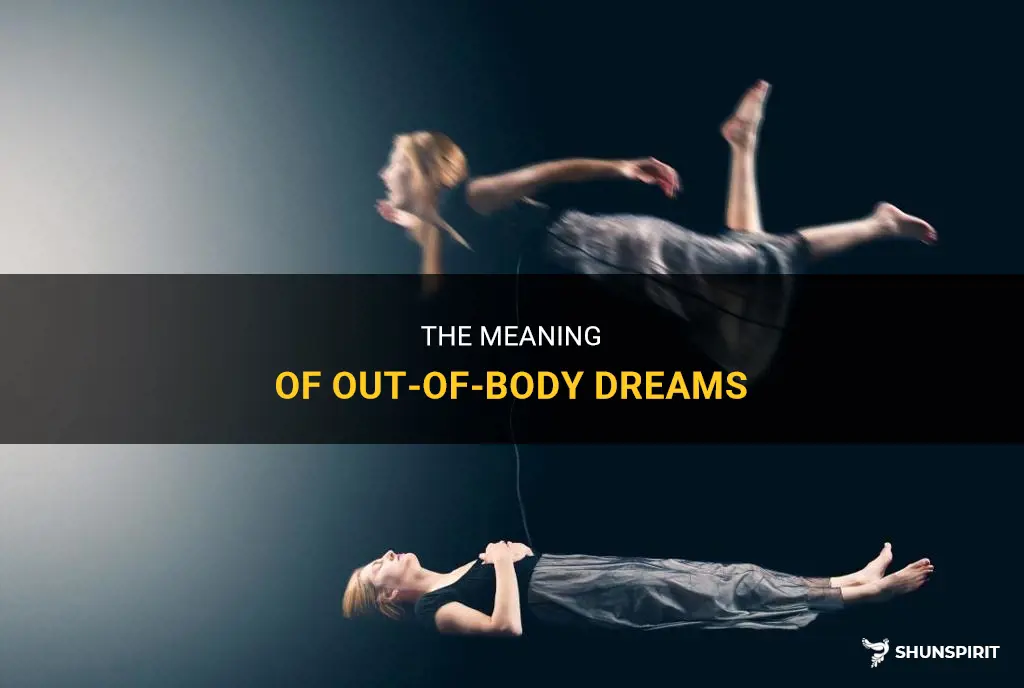
Have you ever had a dream where you felt like you were floating above your own body, watching yourself from a distance? These dreams, known as out of body dreams, hold a fascinating meaning that goes beyond the realms of our everyday experiences. They hint at the possibility of extraphysical existence and offer a glimpse into the mysteries of the human mind and consciousness. Join us as we delve into the intriguing world of out of body dreams and explore their profound significance.
What You'll Learn
- What is the scientific explanation for out of body dreams and their meaning?
- Is there any evidence to suggest that out of body dreams have a deeper spiritual or metaphysical significance?
- Can the meaning of an out of body dream change depending on the individual and their personal experiences?
- Are there any cultural or historical interpretations of out of body dreams that provide insights into their meaning?
- How can one interpret and analyze their own out of body dreams to gain a better understanding of their personal meaning?

What is the scientific explanation for out of body dreams and their meaning?
Out of body dreams, also known as astral projection dreams, have fascinated humans for centuries. These dreams involve a sensation of leaving the physical body and exploring the world in a non-physical form. While many people believe these experiences have a spiritual or metaphysical significance, scientists offer a different perspective on the phenomenon.
The scientific explanation for out of body dreams is rooted in the workings of the brain and the mind. During sleep, the brain goes through various stages, including rapid eye movement (REM) sleep, where most of our dreams occur. During REM sleep, the brain is highly active, and certain areas associated with self-awareness and perception become activated.
It is hypothesized that during out of body dreams, the brain creates a simulation of the body's movement and perspective based on past experiences. This simulation is projected onto the dream environment, creating a sense of disembodiment and a feeling of exploring the surroundings. This simulation is similar to how the brain creates our everyday perception of the external world.
One possible explanation for the meaning of out of body dreams is the brain's need for self-identity and exploration. The brain constantly builds models of the environment and the self to navigate the world. Out of body dreams may be a way for the brain to test and refine these models, allowing for better adaptation and survival in waking life.
Individual experiences of out of body dreams can vary greatly, with some individuals reporting vivid and detailed "trips" to other places or even different dimensions, while others may only experience a vague sense of floating or detachment from the body. These experiences can be influenced by a range of factors such as sleep quality, stress levels, and prior knowledge or beliefs about astral projection.
While the scientific explanation for out of body dreams focuses on the brain's simulation and modeling processes, it is important to note that these dreams can still hold personal and subjective significance for individuals. Many people find these experiences to be deeply meaningful, providing a sense of spiritual connection or insight. The meaning of out of body dreams can be explored through personal introspection, reflecting on the emotions and symbols present in the dream, and how they relate to one's own life and beliefs.
In conclusion, the scientific explanation for out of body dreams revolves around the brain's simulation and modeling processes. These dreams are believed to be a result of the brain's need for self-identity and exploration, and may serve as a way for the brain to refine its models of the self and the environment. While these dreams can have personal significance, it is important to approach them with a scientific understanding of the brain's workings and the potential influence of individual beliefs and experiences.
The meaning behind dreams of running away
You may want to see also

Is there any evidence to suggest that out of body dreams have a deeper spiritual or metaphysical significance?
Out of body experiences (OBEs) have long been a topic of fascination and intrigue. Many people have reported having dreams or experiences where they feel as though they have left their physical bodies and traveled to different realms or dimensions. Some individuals believe that these occurrences have a deeper spiritual or metaphysical significance. However, when examining OBEs from a scientific perspective and looking at real experiences, there is little concrete evidence to support these claims.
OBEs occur when a person feels as though their consciousness has left their physical body and is able to explore their surroundings in a non-physical form. These experiences can happen spontaneously or be induced through various techniques such as meditation or lucid dreaming. While they can be incredibly vivid and realistic, they are ultimately subjective experiences that cannot be objectively measured or observed.
From a scientific standpoint, OBEs can often be explained by different physiological and psychological factors. Some researchers theorize that OBEs may be the result of brain activity, such as the disruption of the body's sense of self-awareness or altered states of consciousness. Others suggest that they may be linked to sleep paralysis, a temporary inability to move or speak while falling asleep or waking up. Sleep paralysis can often be accompanied by vivid hallucinations, including the sensation of leaving one's body.
Several studies have been conducted to try and understand the phenomenon of OBEs, but the results have been largely inconclusive. For example, in one study published in the Journal of Nervous and Mental Disease, researchers found that individuals who reported having OBEs had similar brain activity patterns to those who did not. This suggests that OBEs may not be indicative of any significant physiological or neurobiological differences.
Additionally, personal anecdotes and experiences cannot be used as definitive evidence for the spiritual or metaphysical significance of OBEs. While some individuals may have profound and life-changing experiences during OBEs, these experiences are highly subjective and cannot be replicated or observed by others. Without any objective evidence or scientific consensus, it is difficult to draw any definitive conclusions about the deeper meaning or significance of OBEs.
It is important to approach the topic of OBEs with skepticism and critical thinking. While they can be fascinating and thought-provoking, it is vital to distinguish between personal experiences and scientific evidence. OBEs may provide individuals with a sense of wonder and exploration, but without concrete evidence, it is impossible to determine their true nature or any potential spiritual or metaphysical significance they may hold.
In conclusion, there is currently little scientific evidence to suggest that out of body dreams have a deeper spiritual or metaphysical significance. While they can be intriguing and captivating experiences, they are ultimately subjective and difficult to measure or observe objectively. It is important to approach the topic with skepticism and critical thinking, distinguishing between personal experiences and scientific evidence. Until further research is conducted, the true nature of OBEs and any potential deeper meaning they may hold will remain a mystery.
The Spiritual Significance of Conscious Awakening within a Dream
You may want to see also

Can the meaning of an out of body dream change depending on the individual and their personal experiences?
Out of body experiences, also known as astral projection, are a fascinating phenomenon where individuals report having a conscious experience of leaving their physical body and exploring the world or spiritual realms in a non-physical form. These experiences can occur during sleep, meditation, or even spontaneously. While some may view these experiences as spiritual or paranormal in nature, others interpret them from a more scientific perspective.
The interpretation of an out of body dream can indeed vary depending on the individual and their personal experiences. Each person brings their unique beliefs, backgrounds, and knowledge to the table, which shapes how they interpret these extraordinary experiences. Someone with a strong spiritual or religious background may perceive an out of body dream as a form of soul travel or a glimpse into the afterlife. In contrast, an individual with a scientific mindset may view it as a product of the brain and its complex neural processes.
Personal experiences and beliefs heavily influence our interpretation of dreams and out of body experiences. For example, imagine two individuals who have both had an out of body dream where they find themselves floating above their bed. The first person, who has a spiritual worldview, might interpret this experience as their soul leaving the physical body and exploring the astral plane. They may feel a sense of liberation and connection to the spiritual realm. On the other hand, the second person, who has a scientific background, may interpret the same dream as a vivid hallucination caused by brain activity during sleep. They may focus on the brain's ability to create realistic illusions and explain the experience through the lens of neuroscience.
Cultural factors also play a role in shaping the interpretation of out of body dreams. Different societies and cultures have varying beliefs and practices related to astral projection and the nature of the self. For example, Tibetan Buddhists have a long history of practicing dream yogas, where they train to become lucid in their dreams and undertake conscious out of body experiences. In this context, such dreams are often seen as a valuable tool for self-transformation and spiritual growth. In contrast, Western societies may have a more skeptical view of out of body experiences and interpret them in a more secular or psychological manner.
It's important to approach the interpretation of out of body dreams with an open mind, considering both the scientific and spiritual perspectives. While science may provide logical explanations based on brain activity and neural mechanisms, it doesn't necessarily invalidate the personal experiences and beliefs of those who interpret such dreams from a spiritual perspective. Ultimately, the meaning of an out of body dream is subjective and can vary greatly depending on the individual and their personal experiences.
In conclusion, the interpretation of an out of body dream can indeed change depending on the individual and their personal experiences. Factors such as personal beliefs, cultural background, and knowledge shape how these experiences are understood. Whether viewed through a spiritual or scientific lens, out of body dreams remain a fascinating and mysterious phenomenon that continues to intrigue and captivate the human mind.
Decoding the Symbolism: Bouquet of Roses in Dreams
You may want to see also

Are there any cultural or historical interpretations of out of body dreams that provide insights into their meaning?
Out of body dreams, also known as astral projection or lucid dreaming, have fascinated humans for centuries. Throughout history, different cultures and belief systems have developed various interpretations of these dreams, providing insights into their perceived meaning and significance.
In ancient Egyptian culture, out of body dreams were seen as a form of communication with the divine. The Egyptians believed that during sleep, the soul could leave the body and travel to other realms of existence. These dreams were regarded as messages from the gods and were often interpreted by priests and scribes. The interpretation of out of body dreams was crucial in guiding individuals' actions in waking life and understanding their purpose in the grand cosmic plan.
In ancient Greek culture, out of body dreams were linked to the concept of "Oneiroi," or dream spirits. Greek philosophers and mystics believed that during sleep, the soul could detach from the physical body and interact with these spirits. Dreams were seen as portals to other dimensions and were thought to provide valuable insights into the future or hidden truths. Greek literature is replete with depictions of individuals embarking on astral journeys in their dreams, encountering mythical beings, and gaining profound wisdom.
In some Native American cultures, out of body dreams were seen as a form of spirit communication and a means of obtaining guidance and healing. Indigenous tribes believed that dreams allowed individuals to connect with their ancestors and animal spirit guides. The interpretation of these dreams was often done by tribal elders or medicine men, who would extract symbolic meanings and messages to assist individuals in navigating their waking lives. Dream rituals and ceremonies were an integral part of the community's spiritual practices, emphasizing the importance and power of these out of body experiences.
In religious traditions such as Buddhism and Hinduism, out of body dreams are often interpreted within the framework of reincarnation and karma. According to these belief systems, dreams can provide glimpses into past lives or future incarnations. They are seen as opportunities for spiritual growth, learning, and resolving karmic debts. The interpretation of these dreams involves analyzing their symbols, emotions, and narratives to gain insights into one's spiritual journey and individual karma.
These cultural and historical interpretations of out of body dreams provide valuable insights into the perceived meaning and significance of these experiences. While such interpretations may vary across different cultures and belief systems, they all recognize the profound and transformative nature of out of body dreams. Whether viewed as a form of divine communication, a means of accessing hidden truths, or a tool for spiritual growth, these dreams have long been regarded as powerful and significant in the human experience.
In conclusion, cultural and historical interpretations of out of body dreams offer diverse insights into their meaning and significance. From ancient Egypt to Native American traditions and Eastern philosophies, these interpretations emphasize the profound nature of these dreams and their potential for spiritual growth and guidance. Exploring these interpretations can enrich our understanding of out of body dreams and open up new perspectives on their meaning in our own lives.
The Surprising Symbolism Behind Dreaming of a Skunk
You may want to see also

How can one interpret and analyze their own out of body dreams to gain a better understanding of their personal meaning?
Dreams have long fascinated humans, sparking questions about their meaning and purpose. One type of dream that has intrigued many is the out of body experience (OBE) dream, where individuals feel as though they are floating outside their physical bodies. These dreams can be both exhilarating and unsettling, leaving people wondering what they mean and how to interpret them. In this article, we will explore the steps to interpret and analyze OBE dreams, using scientific research and real-life experiences.
Step 1: Remember and Record the Dream
The first step in analyzing any dream, including OBE dreams, is to remember and record the details. Upon waking, take a few moments to recall the dream and write down everything you remember. Be as detailed as possible, noting any emotions, images, or sensations experienced during the dream. This step is crucial because it helps preserve the dream's details and allows for more accurate analysis.
Step 2: Understand the Scientific Perspective
Before diving into personal interpretation, it is important to understand the scientific perspective on OBE dreams. Neuroscientists suggest that these dreams may be a result of the brain's intricate processes during sleep. During REM sleep, the stage where dreams occur, the brain is highly active, and the body's muscles are temporarily paralyzed. It is possible that the sensation of floating outside one's body is a result of the brain's attempt to make sense of this physical immobility.
Step 3: Analyze Personal Feelings and Emotions
Once the dream is recorded and the scientific perspective is considered, it is time to analyze personal feelings and emotions experienced during the dream. Reflect on the emotions felt during the dream and how they may relate to your waking life. For example, if the dream left you feeling peaceful and free, it could indicate a desire for more freedom or a need to let go of control in your waking life. On the other hand, if the dream was unsettling or scared you, it could reflect underlying anxieties or fears.
Step 4: Identify Symbolism and Metaphors
Dreams often communicate through symbolism and metaphors. Analyze the imagery and symbols present in the OBE dream to extract meaning. For example, floating above a familiar place or interacting with specific objects may have symbolic significance. Consider the associations these symbols have in your personal life and how they might relate to your current situations or emotions.
Step 5: Connect with Real-Life Experiences
To gain a deeper understanding of the OBE dream's personal meaning, it is crucial to connect it with real-life experiences. Look for any parallels or similarities between the dream and your waking life. For instance, if the dream involved a sense of detachment from your physical body, it may relate to feelings of disconnect or disassociation you may be experiencing in your waking life.
Step 6: Seek Guidance from Experts
Interpreting dreams can be a complex process, and seeking guidance from experts can be beneficial. Psychotherapists, psychologists, and dream analysts can offer valuable insights and help unravel the layers of meaning embedded in OBE dreams. They can provide a fresh perspective and guide you in exploring the dream's significance within the context of your personal life.
In conclusion, interpreting and analyzing OBE dreams requires a multi-step approach that combines scientific understanding, personal reflection, symbolic analysis, and connection with real-life experiences. By following these steps and seeking the guidance of experts, individuals can gain a better understanding of the personal meaning behind their OBE dreams and use that knowledge to enhance self-awareness and personal growth.
The Blue Dream: Unraveling its Meaning
You may want to see also
Frequently asked questions
Out of body dreams typically suggest a sense of detachment or disconnection from your physical self. They can symbolize a desire for freedom, exploration, or a need to escape from the stresses of daily life.
Out of body dreams can have both spiritual and symbolic meanings. From a spiritual perspective, they may indicate a heightened state of consciousness or a journey into the realm of the spirit. Symbolically, they can represent a desire to transcend limitations or explore different aspects of yourself and your surroundings.
Out of body dreams and astral projection are closely related but not exactly the same. Astral projection is believed to be a deliberate, conscious act of leaving the physical body and traveling to other realms using the astral body. Out of body dreams, on the other hand, occur during sleep and are often less under conscious control. However, some people may experience astral projection through their dreams.
Out of body dreams are relatively common and can happen to anyone. They are a natural part of the dreaming process and can occur spontaneously or as a result of specific circumstances or influences. However, if they become frequent and interfere with your daily life or sleep patterns, it may be helpful to discuss them with a mental health professional.








3 Comments
Charley Hewitt
Isla Blanchard
Steffi Montoya
Author